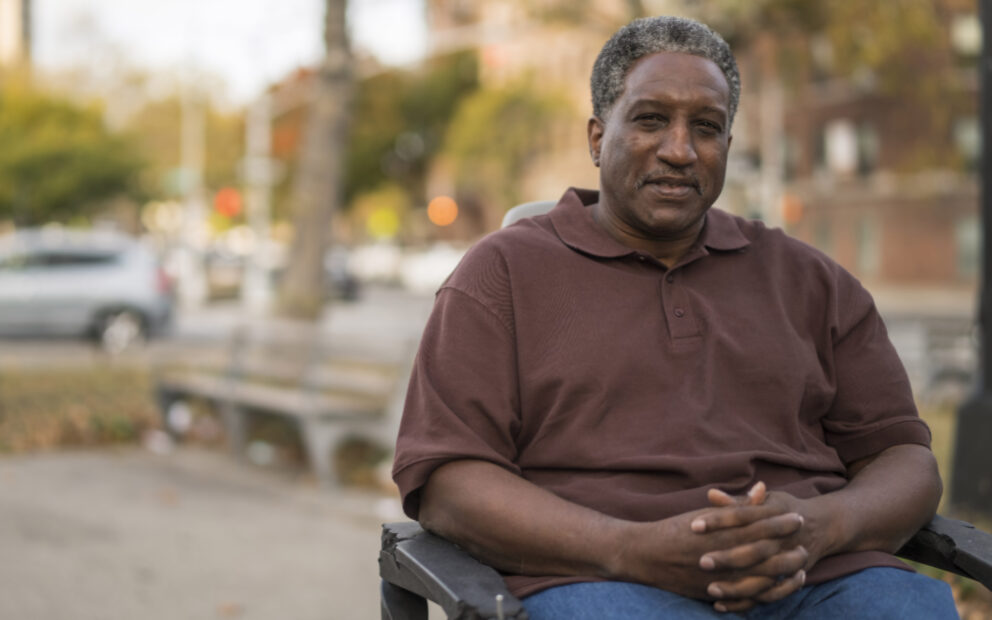Moving bureaucratic mountains just to get home

Alex Johnson*, a retired police officer and Ford Plant worker, has a spacer in his knee because of a failed surgery. Before the pandemic, he obtained a home modification loan to make his home easily accessible. He installed a ramp and modified the first floor. Despite having reduced mobility, he was able to stay in his home and cover his costs with the help of Consumer Directed Community Supports through Alternative Care (CDCS/AC).
In December of 2019, Johnson was hospitalized after a fall and was discharged to rehabilitation in a nursing home. His initial stay was covered by Medicare and a supplemental policy, but that coverage ran out after a few weeks.
Johnson contacted Legal Aid’s Senior Law Project for help and Supervising Attorney Gordon Solo took the case. He helped Johnson get on Medical Assistance (MA) so he wouldn’t be immediately discharged from rehab. Solo and the Ombudsman at the facility tried to get Johnson on track for a reparative surgery, but all elective surgeries shut down with the pandemic. When surgeries opened back up months later, the surgeon said the operation was too risky.
“I was getting medical treatment for a bad leg, but I was in there a long time,” Johnson says. “What they were doing for me wasn’t different than what could be done at home. I’d rather be at home, where I’m happier. They wouldn’t let me go.”
Fighting to Live Independently
The facility assessment said Johnson was too high of a risk to go home. The County wouldn’t reopen his CDCS/AC, and Johnson was stuck in a bureaucratic quagmire in the nursing home.
“The nursing home just basically wrote Alex off at that point,” says Solo. “He was struggling to maintain, and we didn’t want him to lose any more ground. The Ombudsman and I got in their face, and then things changed.”
Solo requested a new CDCS/AC assessment. Johnson was again denied as “risk too high.” Solo appealed the denial. While the appeal was pending, Solo and the Ombudsman convinced the medical staff and the nursing home to increase Johnson’s physical therapy.
“Alex’s primary doctor was really helpful,” Solo says. “He was willing to testify and help in any way he could. The doctor was there in our corner, saying that he supported Alex returning home.”
In the midst of the appeal, the Minnesota Department of Human Services (DHS), taking a new position, informed the county that Johnson was categorically ineligible for CDCS/AC because he was on Medical Assistance. The Human Services Judge said that if Johnson’s condition improved with increased physical therapy, then she would rule on DHS’s position regarding eligibility.
A Favorable Decision
Johnson’s condition did improve with the increased therapy. A new assessment approved Johnson to return home and the matter was set for a hearing. The judge ruled in Johnson’s favor, ordering the county to reinstate the CDCS/AC waiver. Johnson, finally released from the quagmire, was able to return home with the services he needs to live independently.
Solo sent a copy of the judge’s decision to his colleagues who work in senior law. A client who suffered a stroke encountered the same roadblock from DHS when she was ready to return to her home in central Minnesota. Supervising Attorney Karla Krueger in Legal Aid’s St. Cloud office filed an appeal, citing the decision in Mr. Johnson’s case. The St. Cloud client also had her CDCS/AC waiver reinstated and is now living at home again.
Someone in His Corner
“When DHS weighed in and said he couldn’t go back on the waiver, it looked bad,” Solo says. “We had to push back on that change. When a person is at their most vulnerable and dealing with physical and emotional pain, depression comes along and it can be a spiral down, especially if nobody’s helping you. The administrative details are so complicated, and it can be a lot to handle. You need someone in your corner.”
“I’d still be in there if I didn’t get a lawyer,” Johnson agrees. “I’d still be sitting up in a nursing home. Gordon kept going, and he wouldn’t give up. I owe a lot to him. He’s quite a lawyer.”
*Name changed to protect client identity

